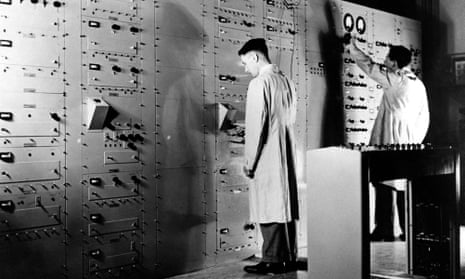Aditya Chakrabortty is basically correct in his analysis of the decline of Britain’s electronics industry and the central role played by Arnold Weinstock, head of GEC (Why does Britain need Huawei? The answer speaks volumes, 8 May). Weinstock was indeed parsimonious; he paid poor salaries, engineers worked in portable buildings and redundancy payments were the lowest the law would allow. In my job as a trade union official, I found him inflexible and uncompromising. Chakrabortty gives him a little too much credit for maintaining a level of research and development that was abandoned by his successors.
While his foreign competitors were selling innovative consumer electronics and products people wanted to buy, Weinstock decided it was safer to build huge cash mountains rather than invest in the civil sector. He concentrated on military production, a source of easy money, provided by his friends in the Ministry of Defence and funded by the British taxpayer. Many of these products were overpriced, delivered late and performed poorly, particularly in the field of radar.
After his death, his empire was cherrypicked and his defence interests largely went to BAE Systems, which made the same mistake by focusing only on the military market. It is now dependent on orders from such countries as Saudi Arabia and the UAE, with its products causing mass destruction in the Yemen and elsewhere. As it is Britain’s largest manufacturing company, the government refuses to criticise those countries that are its customers. The legacy of Arnold Weinstock is not one we can be proud of.
Tim Webb
London
Congratulations to Aditya Chakrabortty for reminding us of the GEC debacle, which epitomises so many of our country’s economic problems. As a former shareholder I still wryly treasure the GEC summary financial statement of 1999 which includes chief executive Lord Simpson’s words: “1998/99 was a significant year for GEC. I believe future historians will see it as the turning point in the modern development of our Company.”
It was certainly a turning point, although not in a desirable direction.
Roger Cooper
Sudbourne, Suffolk
In 1966 I was employed by AEI, a larger electrical group than the GEC company discussed by Aditya Chakrabortty, at its Rugby research laboratory. It was taken over by GEC in a deal supported by one Anthony Wedgwood Benn, then a Labour minister much supportive of the formation of huge monopolistic enterprises. GEC shut down the Rugby laboratory within a year, together with the Lincoln laboratory specialising in semiconductor research. The same thing happened to the Nelson Research Laboratories of English Electric, also taken over by GEC.
Chakrabortty quotes a Sheffield University academic who believes that GEC “used to invest heavily in research and development”. The facts speak otherwise. Weinstock supervised the closure of a major part of British R&D capability because he appeared to believe it was a waste of money. The result was the death of the British electronics industry.
Michael Prior
Hebden Bridge, West Yorkshire
GEC was never – at least in the postwar years – comparable with Huawei for its enterprise and innovation. As a student apprentice with GEC’s Marconi Radar Systems in Leicester in 1969-71, I directly experienced managing director Arnold Weinstock’s cost-cutting – from the number of phone calls from debt collectors, representing local suppliers, that came into the purchasing department.
For the first third of my career as a business and technology journalist (46 years and counting) I wrote about the worldwide electronics industry, including pioneers of the microprocessor business, such as Intel, Motorola and Texas Instruments. I was invited to meet GEC’s technical director, Robert Clayton, at the group’s Hirst Research Centre in Wembley in the mid-1970s, only to find myself being berated for an hour because I’d written in The Engineer that British companies were way behind their US rivals.
My feeble defence, as a startled 25-year-old facing a grandee of the industry, was that GEC and other UK companies relied on safe, armour-plated developments for the Ministry of Defence, paid for at cost-plus, and they had no desire to innovate in the commercial world.
But what I said was true. GEC was no Huawei. Even in its commercial business, mainly TV sets, it relied on protectionist measures that stifled competition.
Alan Burkitt-Gray
London
Weinstock differed little in effect from “the frenetic wheeler-dealing of Simpson and Mayo”. He pioneered the hostile takeover in the 1960s, ruthlessly cut costs, and sacked employees in search of profits to become a role model for other CEOs. Within a few months of taking over AEI, the axe fell, leaving only 29 of 171 major plants unscathed. Soon afterwards, GEC took over English Electric, the last of the big three electrical engineering companies. Weinstock then employed 228,000 workers, but by 1974 he had cut that by 25% to 170,000, becoming known as Britain’s largest “unemployer”.
And all hell had in fact broken loose well before Weinstock stepped down in 1996.
The AEI takeover led to a notorious UK accounting scandal. AEI had forecast profits of £10m, but GEC later reported that AEI had made a loss of £4.5m for the year – a huge, for then, £14m difference, most of which reflected GEC’s judgment about the value of AEI’s inventories and contracts. Part of GEC’s campaign first to discredit and get rid of the old management and second to close down many of AEI’s plants. But also the first time that the wider public saw how malleable profit figures could be. This scandal and similar ones in relation to Robert Maxwell’s takeovers led to the Accounting Standards Committee and the London Stock Exchange’s takeover panel being set up.
David Murray
Wallington, Surrey
Join the debate – email guardian.letters@theguardian.com
Read more Guardian letters – click here to visit gu.com/letters
